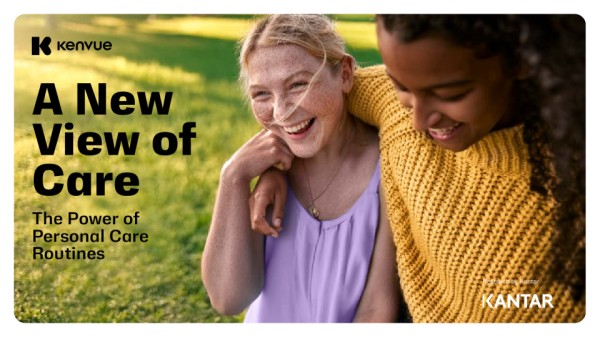[凯度]:个人护理新视角:个人护理常规的力量
香薰艺术与个人护理:精油的疗愈力量 #生活乐趣# #生活艺术# #健康生活艺术# #个人护理艺术#

The Power ofPersonal CareRoutines Table of Contents Foreword3 ExecutiveSummary5 TrustandInfluence:Sources Shaping Personal Care Decisions11 Foundations:Motivations, Milestones, and Mindsets of Personal Care24 Consistency:Health Outcomes of Personal Care Routines32 Maintenance:Emotional Impacts of Consistent Care43 TheFuture:Evolving Personal Care Routines50 Implications:The Way Forward56 Appendix:Methodological Overview63 Foreword What used to be defined by keeping up with doctorvisits, treatments, and basic hygiene, personal carehas expanded to include individualized, preventiveactions taken in our everyday lives. Today, more peoplerecognize the power of daily routines formed at home,continuing the shift toward a future where health andwell-being are proactively maintained. Aroundtheworld,howconsumersthinkaboutcareischanging. At Kenvue, we believe that daily care routines canhave a profound cumulative impact on well-being.ANewViewofCareexplores the motivations to beginand sustain personal care routines, how routinesimpact health and emotional well-being, and thesources of influence shaping care today. With insights from over 10,000 consumers around theworld, we found that routines form the foundation ofhow we care for ourselves.Evensmall,consistentactionscanleadtomeaningful,measurablebenefits.But for many, building effective routines canstill feel out of reach. We believe an effective routine isone that is simple to stick with, solves real needs, andmeaningfully impacts health and well-being over time. In this report, the term“personal care routine” isdefined broadly to encompassa wide range of practices thatpeople regularly engage in tosupport their overall well-being. This includes the consistent use of personal care products (e.g., for hair,skin, oral care, etc.), taking vitamins and supplements, over-the-counterallergy and pain medications, and engaging in activities like eating welland practicing mindfulness. This inclusive framing was presented tosurvey participants to ensure a comprehensive understanding of personalcare that reflects both product usage and broader well-being practices. ExecutiveSummary 1. Personal care is expandingthe definition of health 2. Trusted sources are not thefirst stops for information Consumers are redefining personal care, moving beyond hygiene and beauty toviewing personal care routines as proactive tools for managing overall well-being,aging, and long-term health. These routines include preventative actions that helpavoid future health issues. They increasingly see routines as supporting their “wholeself—mind, body, and spirit” rather than primarily for enhancing appearance. Consumers place the most trust in healthcare providers and family members forpersonal care advice, but they most often turn to more accessible and immediatesources like search engines and social media. Despite relying on online sources, many are skeptical about the personal careinformation they get on social media, sharing concerns like the potential to purchasecounterfeit products and deciphering unverified product claims. Social mediainfluencers—though less trusted—are popular with younger audiences, showingaccessibility drives where people seek personal care information. 3. The influence of AI isrising, but not fully trusted 4. Self-motivation isthe strongest driver, butsocial influence matters Generative AI tools are increasingly integrated in how consumers research personalcare information. However, trust still lags on these tools, with only about a third ofthose with routines mentioning they trust the information provided via generative AI. Most people start a personal care routine to do something deeply personal forthemselves, not because of outside pressures or big life changes. While thismotivation is internal and universal, friends and influencers often spark the idea. 6. Emotional well-beingis tied to routine consistency 5. Legacy brands winconsumer trust Globally, when consumers fall short of maintaining their personal care routines,they commonly feel guilty and disappointed. These feelings are often followed byanxiety or worry, and for some, a more negative perception of body image. Thisreveals how deeply intertwined personal care practices are with emotional healthand self-perception. Large, established brands are consistently viewed as among the mostreliable brands for personal care information, considered significantlymore credible than emerging ones. TypesofbrandstrustedtogivecredibleinformationonlineaboutpersonalcareroutinesTop-two-box agreement: completely or mostly trust; Among global consumers with routines 7. Cost is not a main barrierto routine care, but financialstress affects consistency 8. Younger generationsplan to spend more onpersonal care Gen Z and millennials plan to boost personal care spending, while oldergenerations expect to hold steady—signaling growing value placed on routinecare among younger consumers. Most consumers do not
网址:[凯度]:个人护理新视角:个人护理常规的力量 https://www.yuejiaxmz.com/news/view/1342000
相关内容
视频号橱窗【个人护理】类目管理规则45%的人不知道!日常护理必须掌握的三个健康秘密
个人护理有哪些新趋势?
最新护理个人心得体会 个人护理心得体会(汇总9篇)
可靠个人护理 个人护理和家庭护理
护理个人心得
《护理病人个人卫生与康复护理操作规范与措施》.pptx
个人护理/个护健康
医疗个人护理 个人护理和家庭护理
老年人日常护理小知识(常规护理、生活安全、照护)

